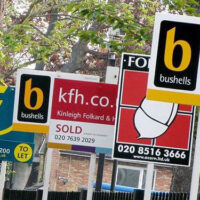
The figures mean that prices would have fallen by a total of 7 per cent from peak to trough.
The Nationwide House Price index is down about 4.5 per cent from its peak, but Deutsche Bank said this is much less than the double-digit correction seen in other countries such as New Zealand.
The bank said in an economic note: “Although this has been the third most acute price correction in modern times, it has done little to reverse previous gains and, in our view, is not a crash.”
Three housing headwinds
However, analysts at the bank flagged three remaining headwinds that will still likely weigh on house prices over the coming quarters.
First, unemployment, which has been largely benign so far, has started rising, and will likely continue to increase.
Second, in a market where half of all borrowers are on fixed rate deals, the effects of rate rises are lagged. According to the Office for National Statistics (ONS), 1.4 million owner-occupiers will see their fixed rate deals end this year. It is predicted that some borrowers will extend terms, shift an element to interest-only, or use savings to pay off lump sums.
But Deutsche Bank warned that “those with no levers to pull face harder times” and that “the lagged effect of higher rates will continue to transmit into the housing market, weighing on house prices.”
Third, affordability is stretched, particularly in London. As rates stay higher for longer, the bank expects this to exert further downward pressure on prices, lengthening the correction.
Debt servicing
The bank also looked at debt servicing costs in an environment of higher interest rates. It said, for example, that a £150,000 mortgage on a 25-year term would cost £636 at 2 per cent interest. But if the interest rate rose to 4 per cent, the monthly mortgage payment would rise to just under £800; at 6 per cent interest rate, households would face a monthly payment of £966.
“With mortgage rates climbing to around 6 per cent, we estimate that the average monthly mortgage payment would be c.50 per cent higher than before – a sizeable increase,” said the bank, “But it’s also worth noting that not all homeowners face refinancing costs. Indeed, the majority (54 per cent) of owner-occupiers own their property outright.”















